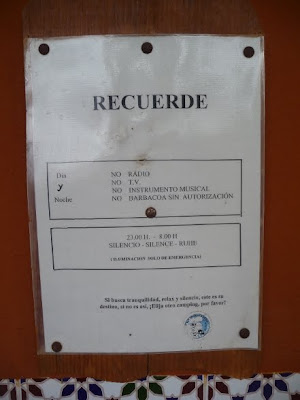We have seen Lascaux and Altamira, both replicas, and also Pech Merle, the real thing, but Cueva de la Pileta, about 15 miles from Ronda, high in the mountains, provides a singular opportunity to see real paleolithic cave art, ranging from 25,000 to 32,000 years old. Vicki decided not to go--poor lighting (you carry your own gas lamp) and poor, damp, slippery footing. But I did the one-hour tour with the owner/grandson of the discoverer of the cave, Sr. Bullon, mostly in Spanish, but enough English to make it a thrill. Cueva de la Pileta is a "working" cave. Water dripping everywhere, pools, rats and mice, every kind of speleological formation in process. Little improvement, no lighting effects (no lighting!), nothing cheesy, much emphasis on preservation of the "art." These artists, to my sense, were not as skilled at those later painters at Lascaux and Altamira. No use of relief in the rock itself. Much of Pileta is simply "abstract"--meaningless (to us) marks on the wall in charcoal or ochre, possibly recording celestial events, or animal kills, or whatever. But it is deeply moving to be in a place where they were, looking at their work. We camped that evening at the turn-off just outside the cave, way high up over the valley. [No pix are allowed in the cave, so I have grabbed three off the web].
 |
It's all under this limestone mountain |
 |
The entrance; once you're you're in and the tour begins, he locks the gate... |
 |
Sr. Bullon, guide, owner, grandson of discoverer of the cave (in 1905) |
 |
Horse |
 |
Fish |
 |
Not sure what... |
 |
Some of the collection of artifacts, paleolithic and neolithic, in the cave |





















































